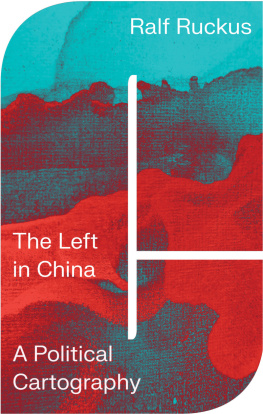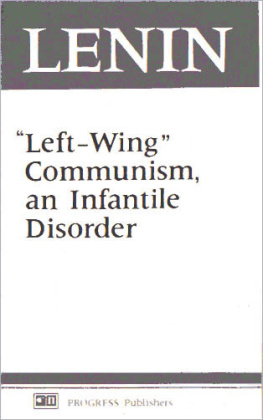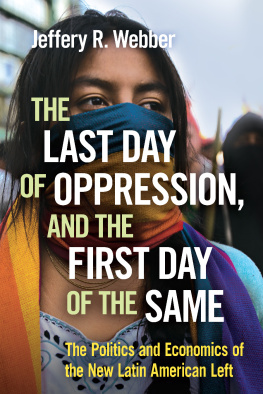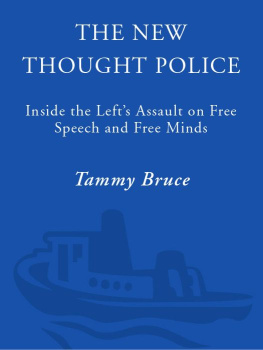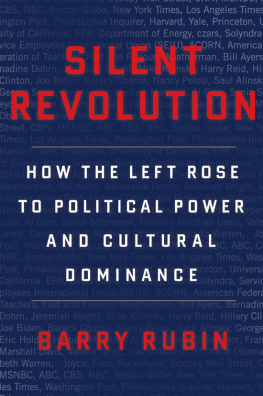Swift - A Left for Itself : Left-Wing Hobbyists and the Rise of Identity Radicalism.
Here you can read online Swift - A Left for Itself : Left-Wing Hobbyists and the Rise of Identity Radicalism. full text of the book (entire story) in english for free. Download pdf and epub, get meaning, cover and reviews about this ebook. City: Lanham, year: 2019, publisher: John Hunt Publishing, genre: Politics. Description of the work, (preface) as well as reviews are available. Best literature library LitArk.com created for fans of good reading and offers a wide selection of genres:
Romance novel
Science fiction
Adventure
Detective
Science
History
Home and family
Prose
Art
Politics
Computer
Non-fiction
Religion
Business
Children
Humor
Choose a favorite category and find really read worthwhile books. Enjoy immersion in the world of imagination, feel the emotions of the characters or learn something new for yourself, make an fascinating discovery.

A Left for Itself : Left-Wing Hobbyists and the Rise of Identity Radicalism.: summary, description and annotation
We offer to read an annotation, description, summary or preface (depends on what the author of the book "A Left for Itself : Left-Wing Hobbyists and the Rise of Identity Radicalism." wrote himself). If you haven't found the necessary information about the book — write in the comments, we will try to find it.
A Left for Itself : Left-Wing Hobbyists and the Rise of Identity Radicalism. — read online for free the complete book (whole text) full work
Below is the text of the book, divided by pages. System saving the place of the last page read, allows you to conveniently read the book "A Left for Itself : Left-Wing Hobbyists and the Rise of Identity Radicalism." online for free, without having to search again every time where you left off. Put a bookmark, and you can go to the page where you finished reading at any time.
Font size:
Interval:
Bookmark:
What people are saying about
This book is essential reading for anyone who is interested in the contemporary state of the left.
Professor Matthew Goodwin, author of National Populism: the Revolt Against Liberal Democracy
In the sometimes febrile environment of contemporary left politics, this book is a measured and evaluative contribution. David Swift cuts through the rhetoric of often violent and divisive exchanges to uncover the roots, motivations, diverse character and strengths and weaknesses of the current phenomenon of so-called identity politics. Ranging from recent work by Fukuyama to the journalistic pages of The Spectator and New Statesman and beyond, the book is an important addition and contribution to this widespread and multi-form debate over the rise, impact and reaction to a newly-emboldened and assertive identity left
Dr Stephen Meredith FRHistS, FHEA. John Antclie Archives By-Fellow, Churchill College Cambridge, 201819 and Head of Politics, University of Central Lancashire
David Swift astutely diagnoses the pathological narcissism at the heart of what he calls the hobbyist left - which has captured the Labour Party. With its preoccupation with language and virtue-signalling, and scant interest in the concerns and culture of actual working people, todays middle-class elitist left no longer speaks to the voters who once gave their support to the Labour Party.
Professor Eric Kaufmann, author of Whiteshift: Populism, Immigration and the Future of White Majorities
David Swift stakes-out a difficulty but really important political space in this book. He is of the left but launches an assault on a generational cohort of left-wing political activists and their preoccupations and prejudices. His argument is provocative and his style uncompromising. But the underpinning research is careful and his conclusions important.
Professor Andrew Hindmoor, author of Whats Left Now? and Head of Politics, University of Sheffield
A Left for Itself
Left-wing Hobbyists and Performative Radicalism

First published by Zero Books, 2019
Zero Books is an imprint of John Hunt Publishing Ltd., No. 3 East St., Alresford,
Hampshire SO24 9EE, UK
www.johnhuntpublishing.com
www.zero-books.net
For distributor details and how to order please visit the Ordering section on our website.
David Swift 2018
ISBN: 978 1 78904 073 9
978 1 78904 074 6 (ebook)
Library of Congress Control Number: 2018952689
All rights reserved. Except for brief quotations in critical articles or reviews, no part of this book may be reproduced in any manner without prior written permission from the publishers.
The rights of David Swift as author have been asserted in accordance with the Copyright, Designs and Patents Act 1988.
A CIP catalogue record for this book is available from the British Library.
Design: Stuart Davies
UK: Printed and bound by CPI Group (UK) Ltd, Croydon, CR0 4YY
US: Printed and bound by Thomson-Shore, 7300 West Joy Road, Dexter, MI 48130
We operate a distinctive and ethical publishing philosophy in all areas of our business, from our global network of authors to production and worldwide distribution.
Also by David Swift
For Class and Country: the Patriotic Left and the First World War
A million or two of workingmens votes for a bona fide workingmens party is worth infinitely more than a hundred thousand votes for a doctrinally perfect platform.
Freidrich Engels, 1886.
The difference between the intellectuals and the trade unions is this: You have no responsibility. You can fly off at a tangent as the wind takes you. We, however, must be consistent and we have a great amount of responsibility.
Ernest Bevin to G.D.H. Cole, 1935.
Cant you see that the problem is you? That politics has nothing to do with being right, that politics is about succeedingYou can wear a T-shirt with the hammer and sickle. You can even carry a huge flag and then go back home with your flag, all while the enemy laughs at you. Because the people, the workers, they prefer the enemy to you.
Pablo Iglesias, founded of Podemeos, 2015.
Around the world, right-wing populists are on the rampage. All too often, voters who traditionally supported the Left fuel their success. In the United States, the 2016 Presidential Election witnessed large levels of white working-class support for the billionaire TV personality Donald Trump. In Israel, Benjamin Netanyahu and the Likud Party alienate many of the original Ashkenazi secular elite, and instead owe their support largely to poorer Mizrahi Israelis and recently arrived immigrants from the former Soviet Union. In Russia and Turkey, reactionary, authoritarian demagogues owe their power to the poor and the poorly educated, while relatively prosperous metropolitan liberals are excluded from government. Understanding this phenomenon is central to the politics of our age: why has the recent crisis of capitalism benefitted not the Left, but the nationalist Right?
Back in 1975, in The Coming of the Postindustrial Society, the academic Daniel Bell predicted an increasingly radical middle class and an ever more conservative working class. As deindustrialisation proceeded, argued Bell, traditional economic divisions would decrease in relevance, and social and cultural issues would come to the forefront. While the United Kingdom is some way behind the United States in this process, the same phenomenon is now taking place.
According to Ipsos MORI, the 2017 General Election was simultaneously Labours best performance among the top three ABC1 social groups, and the Conservatives best score among C2DEs since 1979, with the two parties improving on their 2015 results among these groups by 12 per cent. Labour gained most ground in seats with the largest concentrations of middle-class professionals
Labour lost Walsall North for the first time since 1976 the Labour majority there in 1997 was 29.9 per cent. The Conservatives won Mansfield for the first time since its creation in 1885 back in 1997, the Labour majority was 43.4 per cent. The Tories also gained Middlesbrough South and East Cleveland, and Labour lost East Derbyshire for the first time since 1935.
This trend was also reflected in the education levels of different voters. According to YouGov, 55 per cent of people with GCSEs as their highest qualification voted Conservative, and only 33 per cent for Labour. For those with A Levels the split was more even: 45 per cent for the Tories and 40 per cent for Labour. However, for those with undergraduate degrees and above, fully 49 per cent voted Labour, and only 32 per cent for the Tories.
It is a similar story with newspaper readership. As might be expected, 79 per cent of Daily Telegraph readers voted Tory, but The Times was the only other broadsheet whose readership substantially backed the Conservatives (58 per cent to Labours 24 per cent). Surprisingly, the readership of the Financial Times was evenly split, with 40 per cent voting Tory and 39 per cent Labour. In contrast, all of the tabloids apart from the Mirror, from the Daily Express (77 per cent) to The Sun (59 per cent) had a readership that was overwhelmingly Conservative.
None of this is necessarily bad for the Labour Party. The party won 40 per cent of the vote in 2017, its highest percentage since Tony Blairs early years. If Labour can win a Parliamentary majority, it doesnt necessarily matter where the votes come from. Nor is there anything new about apparently altruistic politics: throughout the history of the British Left, its ranks have always been swelled by allies acting selflessly; the womens movement had male allies, anti-racist groups had white allies, and gay rights groups had straight allies.
Next pageFont size:
Interval:
Bookmark:
Similar books «A Left for Itself : Left-Wing Hobbyists and the Rise of Identity Radicalism.»
Look at similar books to A Left for Itself : Left-Wing Hobbyists and the Rise of Identity Radicalism.. We have selected literature similar in name and meaning in the hope of providing readers with more options to find new, interesting, not yet read works.
Discussion, reviews of the book A Left for Itself : Left-Wing Hobbyists and the Rise of Identity Radicalism. and just readers' own opinions. Leave your comments, write what you think about the work, its meaning or the main characters. Specify what exactly you liked and what you didn't like, and why you think so.




